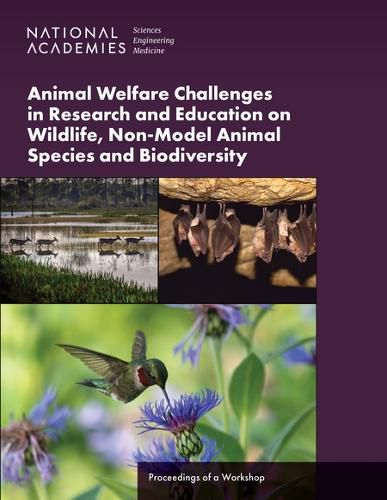Readings Newsletter
Become a Readings Member to make your shopping experience even easier.
Sign in or sign up for free!
You’re not far away from qualifying for FREE standard shipping within Australia
You’ve qualified for FREE standard shipping within Australia
The cart is loading…






Research to advance understanding of the ecology and biology of wildlife species is more important than ever as the world confronts issues ranging from biodiversity loss to the emergence of zoonotic diseases. However, the current understanding of animal welfare in research and education has been based on laboratory work with specific domesticated species. Wildlife research represents a starkly different context and with different implications for animal welfare. Wild species that are the subject of research have extremely diverse physiologies and behaviors and live in diverse habitats. This makes it challenging and sometimes impossible for wildlife researchers to follow the recommendations outlined in the Guide for the Care and Use of Laboratory Animals (NRC 2011) and other guidelines developed for a laboratory-based, biomedically focused research context.
To explore issues associated with the unique welfare considerations of wildlife research, the National Academies of Sciences, Engineering, and Medicine (under the auspices of the Roundtable on Science and Animal Welfare in Laboratory Animal Use), hosted a workshop titled Discussing and Understanding Animal Welfare Challenges in Research and Education on Wildlife, Non-Model Animal Species, and Biodiversity on February 9-10, 2022. The event, held virtually, included pre-recorded presentations and overarching discussions to explore this topic in breadth and depth. More than 1,800 participants from academia, industry, government, and nonprofit organizations joined the webcast. This proceedings summarizes key topics covered in the workshop presentations and discussions based on transcripts, recordings, and slides from the event.
Table of Contents
Front Matter Introduction Workshop Opening Remarks Session One: Perspectives on Animal Welfare Considerations Between Laboratory Animal and Free-Ranging Fish and Wildlife Field Research Session Two (Part 1): Review of the Laws, Regulations, and Permits Associated with Fish and Wildlife Session Two (Part 2): Case Studies and Examples Session Three: Wild Animal Population Concerns Day One Synthesis Session Session Four: Restraint and Handling of Animals in the Field to Include the Use of Compounds for Capture and Handling Session Five: Role of Veterinary Medicine in Wildlife Research Session Six: Pain and Distress, Euthanasia, Humane Killing, and Lethal Take Session Seven: Transition of Wild Animals to Captive Settings and Housing Challenges Session Eight: Available Take-Home Resources Day Two Synthesis Session References Appendix A: Statement of Task Appendix B: Workshop Agenda Appendix C: Workshop Speaker Biosketches Appendix D: Workshop Planning Committee Biosketches Appendix E: Workshop Synthesis Session Moderator Biosketches
$9.00 standard shipping within Australia
FREE standard shipping within Australia for orders over $100.00
Express & International shipping calculated at checkout
Research to advance understanding of the ecology and biology of wildlife species is more important than ever as the world confronts issues ranging from biodiversity loss to the emergence of zoonotic diseases. However, the current understanding of animal welfare in research and education has been based on laboratory work with specific domesticated species. Wildlife research represents a starkly different context and with different implications for animal welfare. Wild species that are the subject of research have extremely diverse physiologies and behaviors and live in diverse habitats. This makes it challenging and sometimes impossible for wildlife researchers to follow the recommendations outlined in the Guide for the Care and Use of Laboratory Animals (NRC 2011) and other guidelines developed for a laboratory-based, biomedically focused research context.
To explore issues associated with the unique welfare considerations of wildlife research, the National Academies of Sciences, Engineering, and Medicine (under the auspices of the Roundtable on Science and Animal Welfare in Laboratory Animal Use), hosted a workshop titled Discussing and Understanding Animal Welfare Challenges in Research and Education on Wildlife, Non-Model Animal Species, and Biodiversity on February 9-10, 2022. The event, held virtually, included pre-recorded presentations and overarching discussions to explore this topic in breadth and depth. More than 1,800 participants from academia, industry, government, and nonprofit organizations joined the webcast. This proceedings summarizes key topics covered in the workshop presentations and discussions based on transcripts, recordings, and slides from the event.
Table of Contents
Front Matter Introduction Workshop Opening Remarks Session One: Perspectives on Animal Welfare Considerations Between Laboratory Animal and Free-Ranging Fish and Wildlife Field Research Session Two (Part 1): Review of the Laws, Regulations, and Permits Associated with Fish and Wildlife Session Two (Part 2): Case Studies and Examples Session Three: Wild Animal Population Concerns Day One Synthesis Session Session Four: Restraint and Handling of Animals in the Field to Include the Use of Compounds for Capture and Handling Session Five: Role of Veterinary Medicine in Wildlife Research Session Six: Pain and Distress, Euthanasia, Humane Killing, and Lethal Take Session Seven: Transition of Wild Animals to Captive Settings and Housing Challenges Session Eight: Available Take-Home Resources Day Two Synthesis Session References Appendix A: Statement of Task Appendix B: Workshop Agenda Appendix C: Workshop Speaker Biosketches Appendix D: Workshop Planning Committee Biosketches Appendix E: Workshop Synthesis Session Moderator Biosketches